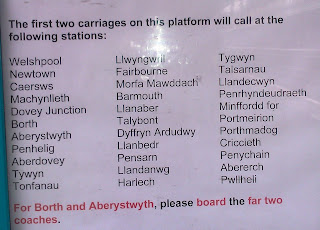I sometimes
travel by train to random destinations - for the pleasure of discovery and the
luxury of a prolonged period of reading, uninterrupted by the distractions of
domestic routines and commitments. On the way I read newspapers, periodicals
and magazines in order to find out what's going on in the world. And, when I
arrive at my destination, I nose around to see what's going on there. Lately I
visited the small, Welsh coastal town of Pwllhelli which sits, with its missing
consonant, so temptingly at the end of a branch line.
In my newspapers
the big story was taxation or, rather, the avoidance of it by the rich and
determined. According to one columnist Google paid a total of £2.4 million in
UK taxes in the same year in which it received £2.5 million in government
subsidies, making it a net beneficiary of the social security system and enlightening
us as to the hollowness of its "don’t be evil" slogan. Taxation is a
simple principle to understand - a proportion of the wealth generated within society
is pooled to provide services - but it is complicated in practice by those who consider
themselves to be exempt from the social compact.
Less
prominently featured was an article describing how software companies are
actively recruiting people with autistic tendencies to work at testing their
products. Could this land them in trouble? Legislation seeks to prohibit
employers from discriminating between potential employees. But then, what type
of personality is most likely to apply for such a job?
Less
prominent still was the startling revelation that a bumblebee with a full belly
is only 40 minutes away from starvation - such is the rate at which it burns
energy. Having just eaten my lunch and with no imminent prospect of physical
exertion I was inclined to feel that we humans lead a privileged life.
The train eventually
pulled into the Welsh-speaking stronghold of Pwllheli just after the shops had
closed for the day. I walked through the quiet town-centre to my accommodation,
a high street hotel/pub which had recently been rescued from closure by a thirty-something
bloke with a rough-and-ready approach to the hospitality business. He asked me
to write down a lot of personal details on a form while he went upstairs to
prepare my room and left me in the bar with the only other customer, a silent, tramp-like
figure who looked as uncomfortable as I felt. My room was clean and comfortable
enough but I left it in search of food and, hopefully, company. I found the
former but, having decided against attending the performance in Welsh at the
arts centre, the remainder of my evening was filled with more reading.
On the
return journey, while scouring the pages for hidden gems, I took wry pleasure
in the discovery that a growing number of French universities are now offering
courses taught in English so as to attract international students. The French,
who - like the Welsh - are protective of their language and harbour resentment
towards us English for the pan-global adoption of our language, seem to be
learning to live with the inevitable.
I felt less
than smug, however, when an article about internet identity theft made me
realise that my own security precautions
are quite inadequate and that I should change all my passwords (if I can remember
them) toute suite (see, no hard
feelings). I recalled with a chill that I had last night obligingly written my
name, address, email and phone and credit card numbers on a piece of paper for
a stranger in a deserted bar in semi-hostile territory.

No comments:
Post a Comment